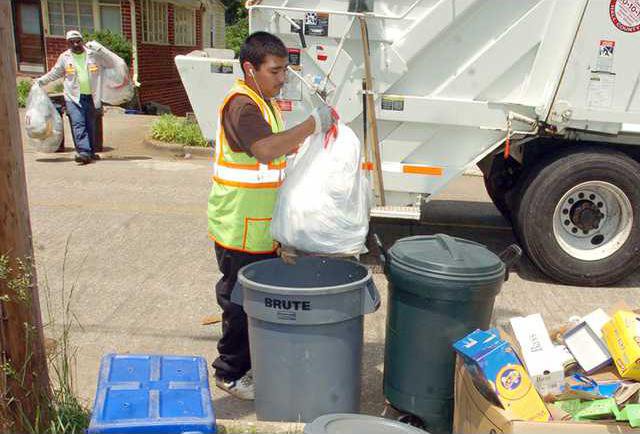- 5:30 p.m. July 15, Georgia Mountains Center, 301 Main St. SW, Gainesville
- 5:30 p.m. July 22, Gainesville Civic Center, 830 Green St. NE, Gainesville
There is less than a month left of a pilot program to study how once-a-week backdoor trash collection works in Gainesville.
And while all of the data has not been compiled, much less analyzed, Danny Owen, superintendent of the city’s solid waste division, says the study is going along as he expected.
“I was expecting the volume (of trash) to increase greatly,” Owen said. “And it has. It’s increased greatly.”
The study began in April to see if the city could save money by switching to once-weekly trash pickup from twice-weekly service.
Tonnage wise, Owen said the city’s solid waste trucks are dumping the same amount each week at the landfill.
The difference is the length of time it takes to get through the day’s routes, and the strain it puts on the city’s solid waste employees, Owen said.
What was once a day’s work, now takes two, he said.
“It’s a whole lot harder on the guys, because two guys are having to go up every driveway and they’re coming down loaded with bags,” Owen said. “...They’ll be glad when it’s over with, because it’s really hard on them.”
The study also has caused confusion for customers. Even though city officials say they placed notices on each customer’s door to notify them of the eight-week study, some residents don’t quite understand when their trash will be collected.
If solid waste trucks do not make it to a customer on Monday, they pick it up on Tuesday, Owen said. But some residents, seeing that it wasn’t picked up on Monday, take their trash back in the house, thinking they’ve been missed, Public Works Director David Dockery said.
“In fact, we haven’t missed it, we just haven’t got there yet with the increased workload,” Dockery said.
Dockery said city officials have been “getting quite a few negative calls” since the program began, the bulk of which come from people who don’t know about the pilot program.
Businesses have complained that residents are dumping trash in their commercial Dumpsters, and residents have called asking for the city to return to the twice-weekly service because of the amount of garbage on the streets, Owen said.
Dockery said it’s too early to tell whether the program is saving money and could be successful.
“The positive and negative aspects of what we’re doing now is really, everything is kind of anecdotal at this point,” Dockery said.
While the numbers have not been analyzed, Owen suspects the city may be saving money on diesel since the garbage trucks are running one fewer day of the week.
But that cost savings may be canceled out by the extra fuel needed for the city’s “scooter trucks,” which are smaller trucks that drive around and pick up trash from homes with longer or steeper driveways.
Under normal circumstances, the scooter trucks work in tandem with a larger truck, driving around the same neighborhood picking up trash from the hard-to-reach homes, filling up a small bucket on the back and driving it over to the main trash truck.
But with the amount of trash that now needs to be picked up, a scooter truck that could pick up trash at 10 to 12 houses can only make it to four or five before it is full, Owen said.
“He’s having to make more trips and longer trips,” Owen said.
The pilot program will run until June 10. After it ends, city officials will sit down, look at whether the program saved any money and decide the next move.
The pilot study is just one option the city is considering to save money on the solid waste operating budget.
City officials also are considering privatizing the service and going to once-weekly curbside service.
Assistant City Manager Angela Sheppard said a request for proposals will be sent out next week on the privatization.
Once city officials gather all the information, they will hold two public meetings — one at 5:30 p.m. July 15 at the Georgia Mountains Center and another at 5:30 p.m. July 22 at the Gainesville Civic Center — to discuss the results and how to move forward with changes to the city’s trash collection service.
The decision to conduct such a thorough public study came after council members and city officials received a flood of e-mails and phone calls about a proposal the council had initially approved in March.
On March 16, the council voted 4-1 to cut trash service to a weekly curbside pickup and make city employees responsible for picking up residents’ recycling. The proposal was meant as a solution to trash collection rates that needed to be increased annually and to help the Solid Waste Division operate off user fees instead of tax dollars. City officials put the plan on hold in April.

